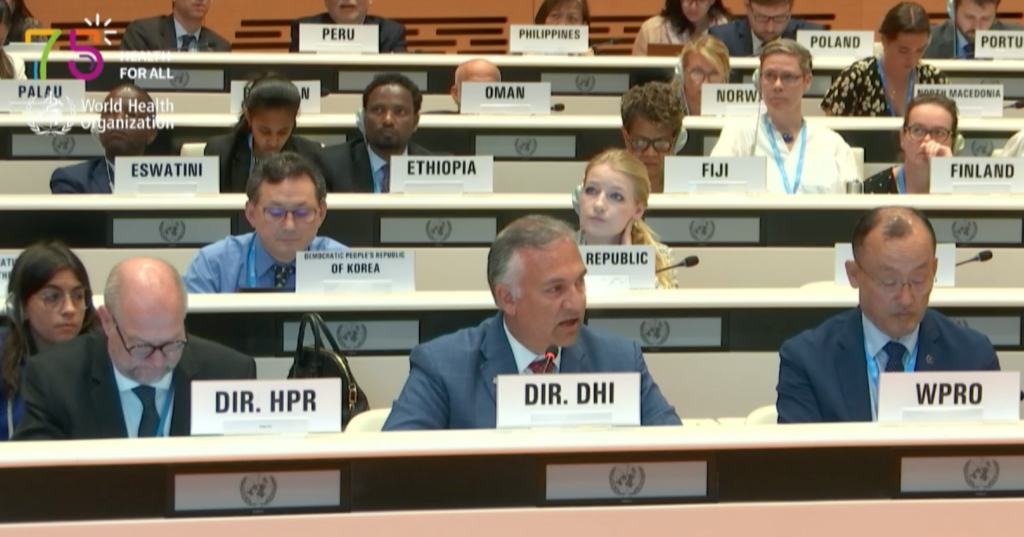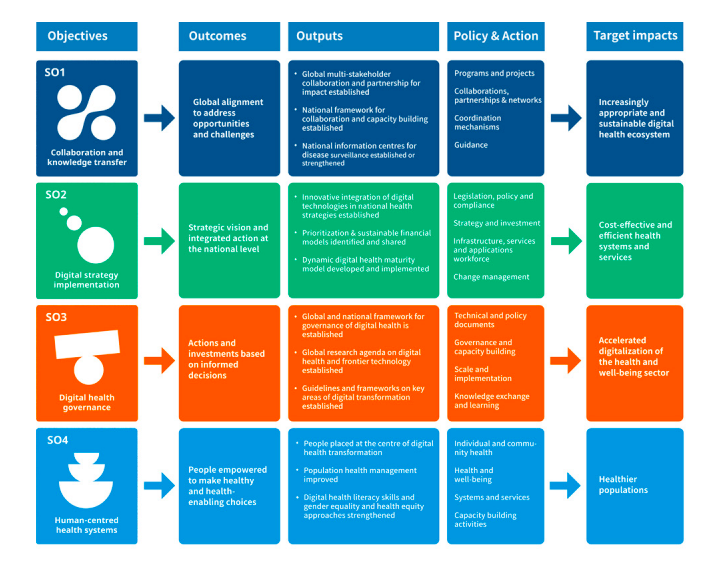
[ad_1]

On Saturday on the World Health Assembly, the World Health Organization (WHO) laid out the present realities of its digital well being agenda as contained within the 2020-2025 global strategy on digital health.
WHO member states see digital well being as an essential car for accelerating progress in direction of WHO’s ‘triple billion’ targets of common well being protection, well being emergencies response and more healthy populations.
Even although the technique was launched simply earlier than the COVID-19 pandemic started, the pandemic response demonstrated that nations’ investments in digital well being additionally strengthened the resilience and responsiveness of well being techniques, the Director of the Department of Digital Health and Innovation, Alain Labrique, informed the WHA.
An formidable technique

The growth of a worldwide technique on digital well being underwent a two-year co-creation journey earlier than its adoption at the 73rd World Health Assembly (WHA). The preliminary draft of the technique doc was drafted and disseminated for feedback via an inner session in early 2019, adopted by a collection of world and regional consultations. The technique goals to enhance well being for everybody, all over the place by accelerating the event and adoption of “appropriate, accessible, affordable, scalable and sustainable person-centric digital health solutions to prevent, detect and respond to epidemics and pandemics”.
The technique additionally goals to develop infrastructure and functions that allow nations to make use of well being knowledge routinely to obtain WHO and UN Sustainable Development Goals.
It argues that the worth and uptake of digital well being options is contingent upon a variety of l elements together with: accessibility, effectivity and sustainability; affordability; and flexibility with respect to completely different well being functions Applications additionally want to take care of affected person privateness and knowledge safety.
To obtain “radical improvements” in well being outcomes, the technique referred to as for funding in governance, institutional capability, workforce coaching, planning, and administration.
“By aligning with nationwide methods for digitizing the well being sector, WHO believes digital well being can improve effectivity, cost-effectiveness, and doubtlessly introduce new enterprise fashions for service supply.
Accomplishments up to now much less clear
Presently, WHO is working to make sure that member states have the capability, steerage, and instruments essential to undertake digital transformation, Labrique informed member states on Saturday. Although he stated the WHO is enabling member states with “the necessary interoperability architecture to enable domestic, regional, and global digital health goals,” he didn’t present particular particulars on how that is being accomplished.
Moreover, WHO stated is facilitating the event of competency-based frameworks to allow the coaching of digitally enabled well being employees of at present and of the long run. “We are working collaboratively with multiple stakeholders to address the digital divide and enable equitable, safe, and ethical access to life-saving technologies for all.”
Just what that actually means in nations, nonetheless, is way much less clear, critiques say. Observers say that WHO’s rollout of its technique has been lackluster with management within the Department and the bigger division of Data, Analytics and Delivery, un-equipped for the duty.
Most just lately, for example, WHO created briefing notes for nations, donors and on a new WHO “Digital Health Clearinghouse” that “assesses, curates and catalogs digital solutions that meet minimum requirements in the delivery of digital health interventions at the primary health care level.”
But whereas the clearinghouse was speculated to start work in early 2023, with “solutions for specific health domains in early 2023, starting with Digital Documentation of COVID-19 Certificates (DDCC),” there’s as of but, no on-line handle for the hassle on WHO’s Digital Health page.
Similarly, a deliberate WHO knowledge portal, Data.who.int which is meant to consolidate WHO’s personal wealth of digital well being property, and supply higher interactivity between WHO headquarters, areas and nation workplaces, has but to get off the bottom.
Countries making progress
Many member states have already earmarked digital well being for extra funding – after the Pandemic served as a wake-up name.
In its remarks, the federal government of Indonesia, which at present holds the G20 Presidency, affirmed its dedication to strengthening international and regional digital well being techniques – together with the nationwide investments it’s making now.
“Indonesia has included digital health as one of our health transformation agenda priorities. Through the formation of digital transformation offerings of health, we aim to build an integrated system that ensures all processes run effectively and provides the best health care services to all to ensure a single national health data which is integrated and safely stored,” the nation’s delegate acknowledged.
UK requires ‘more work’ by WHO on digital well being
Meanwhile, the UK authorities, whereas acknowledging WHO’s present efforts, stated that the company must do extra.
“While there was vital progress on digital transformation, [way] extra work is required to unlock its advantages in well being and social care, stated the UK delegate.
“WHO’s leadership is vital in bringing together governments and other key stakeholders to advance the digital health agenda and address shared challenges such as data governance, interoperability, and incentivizing innovation,” he acknowledged.
The UK additionally urged the WHO to give attention to “aligning and harmonizing” digital well being requirements and making certain that extra detailed updates on progress are included in future WHA stories.
In its submission, the International Pharmaceutical Students Association referred to as on WHO and member states to empower younger well being care professionals to bridge the digital literacy hole locally by together with digital well being and formal healthcare schooling curricula.
The affiliation additionally referred to as for the creation of an enabling surroundings for younger innovators by establishing clear funding and mentorship mechanisms. It additionally really helpful the implementation of a harmonized digital technique that features neighborhood pharmacies.
Image Credits: WHO.
Combat the infodemic in well being data and help well being coverage reporting from the worldwide South. Our rising community of journalists in Africa, Asia, Geneva and New York join the dots between regional realities and the massive international debates, with evidence-based, open entry information and evaluation. To make a private or organisational contribution click on right here on PayPal.
[adinserter block=”4″]
[ad_2]
Source link